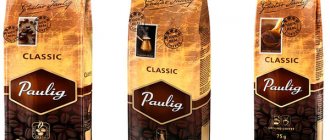Paulig coffee ranks second in consumer demand in Russia. Initially, the Baltic countries drew attention to the drink; later, other regions of the country became devoted to the velvety shades of coffee. The products are produced in Finland and Northern Europe, but the grain is only processed here, varieties are grown in southern countries.
The range of the brand, named after Gustav Paulig (who was the first to use industrial roasting in Europe), impresses with its variety of tastes. Now the company is able to offer exquisite and unusual blends created from the best Arabica varieties. The Finnish brand also offers consumers its own coffee machines and Paulig Cupsolo capsules.
Coffee consumption history
It’s hard to believe, but just one hundred and fifty years ago the task of roasting and grinding beans lay entirely on the shoulders of the consumer. Housewives went to the Colonial Goods shop, where, in addition to coffee, they sold tea, spices, rum and cigars. There they bought grains as green as peas. When they got home, they fried them and then ground them in a hand mill. As you can see, the process of preparing one cup of coffee was long and resembled a complex ritual. But all Europeans started their morning with it. Paulig coffee became the first “almost ready” drink in Finland. All that was required of the housewife was to simply cook it. But the path to the heart of the consumer was long. And history testifies to this. It makes clear that if you prioritize the high quality of your products, then success will invariably contribute to you.
Capsule coffee
One package contains 16 capsules, each of which is designed to brew one cup. The advantages of the product are convenience and speed of preparation. The capsule is placed in a special compartment of the coffee machine without first opening it, thanks to which the freshly brewed drink has a wonderful aroma and deep taste. The range includes classic black coffee and cappuccino.
Our store offers only original products from a well-known brand. Purchases are made through the website. After ordering, our manager will contact you to clarify details. Fast delivery of goods is carried out throughout the city of Moscow and all regions of Russia.
Company history
There lived in the second half of the nineteenth century in the German city of Lübeck a certain young man named Gustav Paulig. He was the son of a gardener, but did not want to follow in his father's footsteps. At first he worked for . Having accumulated initial capital, Gustav moved to Helsinki and opened a shop selling colonial goods at 10 Fabian Street. This happened in 1876. But within five years, the Latin letter “P”, with which Paulig marked his goods, became a symbol of the highest quality in the capital of Finland. The young entrepreneur did not want to stop there. He not only ordered the best varieties of tea and other goods from tropical countries from suppliers. Already in nineteen hundred and four, he adopted the invention of the American John Arbuckle and began to roast coffee beans industrially. To do this, he bought a workshop and warehouse in the Katajanokka area. Consumers liked Paulig roasted coffee beans.
Espresso Barista
An interesting variety of Paulig coffee is Espresso Barista.
It has a sour, sweet and bitter taste, harmoniously combined together. This taste is provided by the highest grade Arabica and Robusta.
Coffee is offered only in kilogram packages.
To brew Paraguayan mate tea I use special utensils: calabash and bombilla. Calabash is traditionally made from a special variety of melon.
One of the most tonic teas in the world, Pu-erh tea, is produced in China. Read more about how to choose pu-erh here.
Do you want to know how to lose weight simply by drinking special tea? Read the instructions for using Turboslim tea at the link: https://ahotcup.com/chai/drugie/turboslim-chajj-dlya-pohudenyja.html
Bertha Paulig and her contribution to the company
In nineteen hundred and seven, Gustav died, and his wife took the helm of the family enterprise. Bertha Paulig had the same entrepreneurial spirit as her late husband. She opened a number of pastry shops throughout Helsinki, where you could not only drink ready-made Paulig coffee with delicious pastries, but also buy beans. In addition, Mrs. Paulig established the sale of mixtures. Previously, you could buy either Arabica - a cultivated variety of coffee with an exquisite taste, or its cheap brother - Robusta, which gave the drink strength. Mrs. Paulig presented two new products to the public. These were mixtures of Juhla and Presidentti. Eduard, the son of Gustav and Bertha, made a new revolutionary breakthrough in coffee processing in 1931. He began not only to grind the grains, but also to roast them to different degrees. And the grandson of the company's founder, Henrik Paulig, proved himself to be a brilliant advertising maker. He brought a girl from America named Paula, who for many years became the “face” of the family enterprise. She was depicted on all labels of the company's products. And, since Paula was dressed in the traditional costume of the Saesmeki people, coffee for many Finns became associated with their national drink. Now Paulig remains a family business. But this did not prevent the company from being one of the first to enter the empty market of the post-Soviet republics. She is known in Russia, Ukraine, and the Baltic countries.
All about coffee: what you can learn at the Paulig Barista Institute
Coffee culture: from “3 in 1” to specialty espresso
Photos : Mikhail Kharin
Over the past decades, the culture of coffee consumption has changed everyday life in the capital beyond recognition. The drink has become part of a lifestyle - some choose an unpretentious but convenient glass to go, some trust large chains, and others become amateur baristas, equipping their own kitchen with an AeroPress and a funnel. Muscovites are learning to appreciate good coffee: selected beans require thoughtful preparation, which will reveal their many shades - from cherry sourness to caramel sweetness. A high-class drink does not require the addition of milk, cream, and even less syrups, which only “clog” the nuances of taste. Visitors to non-specialized establishments still prefer “white drinks” (prepared with milk), but along with coffee consumption there is a growing interest in the art of its preparation: alternative brewing methods, unusual combinations or simply patterned designs on lattes.
Only a professional barista can adequately prepare good coffee - the various secrets of the skill cannot be mastered in online training lasting one or two weeks. Water temperature, strict grain gramming, second-by-second brewing and many other details of the process directly affect the taste. The barista's knowledge and skills base has been accumulating for decades, and the main guardian of the intricacies of the profession is the international non-profit organization Specialty Coffee Association (SCA). It is SCA that defines the key standards for creating a drink from coffee beans around the world. The community helps experts exchange experiences, and also popularizes the product and the barista profession as a whole, holding entire championships in “coffee” disciplines - from latte art to espresso making.
In 1998, the Specialty Coffee Association developed its own training system that allows it to train specialists, confirming their high-quality reputation. The holder of an SCA certificate, having invested in his education, has the opportunity to return the investment by starting a teaching career: this is how the educational programs of the Association become available to more people. In Russia, however, there are very few such professionals - less than thirty people.
Galina Belousova
Paulig Business Development Manager
“Paulig is an expert in the coffee industry: we have unique knowledge and skills, so it is not surprising that we decided to join the SCA training system. After all, the Association is a community that unites coffee professionals and organizations from more than 100 countries.”
Paulig opened its first Barista Institute, which now provides training according to SCA standards, forty years ago in the company’s homeland: the training center settled in a coffee shop in the center of the capital of Finland, Helsinki. In 2021, the brand’s flagship coffee shop opened in Moscow: a three-story location on Myasnitskaya combined the coffee area itself, a store and a training space. The capital's Paulig Barista Institute conducts trainings, introducing coffee lovers to the basics of its preparation, and is preparing to launch the SCA educational program, designed for professionals. Obtaining the certificate necessary for launch is planned for 2021.
Coffee expertise: 145 years of Paulig experience
The Paulig brand dates back to 1876, when the Lübeck German Gustav Paulig moved to the Grand Duchy of Finland and began importing and selling colonial goods - from cognac and port wine to flour and salt. An ambitious and sensitive businessman, Paulig analyzed his income over several decades and in 1904 decided to focus on roasting beans and then selling his own coffee. Thus began the biography of an international brand that Russians rarely recognize as Finnish: an invigorating drink is poorly associated with a cold and reserved country. Over almost a century and a half on the market, Paulig has accumulated serious “coffee” expertise, and sharing it with specialists and consumers is one of the company’s key goals.
You can buy coffee from Paulig both in public retail chains - any of us have seen recognizable packs in Pyaterochka, Perekrestok or Azbuka Vkusa - and in restaurants and cafes. The familiar coffee from the McDonald's chain, for example, is also prepared with Paulig beans. A turning point in the history of the company in Russia was 2011 - the first bean roasting plant opened in Tver. Finally, the opening of the Paulig flagship coffee shop in 2021 allowed us to take the brand’s presence in the market to a completely new level.
Elena Gushchina
manager of Paulig Café&Store
“The opening of the Barista Institute allows us to better acquaint consumers with the intricacies of coffee culture and opens up the opportunity to train a large number of professionals who will be able to delight many people every day with high-quality coffee. Through the Barista Institute, we can unlock the secret of this coffee magic.”
Visitors to the location can try the entire range of drinks, from espresso to raffa, made with Paulig beans, buy a pack of their favorite brand to take home, and immerse themselves in coffee culture at the Barista Institute trainings. The latter is given a separate space - the glass doors of the “cathedra” invariably attract the attention of guests of the establishment: every day the employees explain to one of the clients that this is not a VIP area, and you won’t be able to drink espresso or Americano there if you don’t come to study. This season, the Institute is conducting classes designed primarily for amateur baristas - professional training will begin in 2021. However, from November 15 to January 15, trainings and master classes are temporarily suspended due to coronavirus restrictions.
Coffee trainers: Dima Korsakov and Dasha Soboleva
Daria, trainer at the Paulig Barista Institute
winner of the qualifying barista championship in the Northwestern Federal District, winner of the Northern Star barista cup in the individual competition, certified judge of the barista championship under the auspices of the WBC
Dmitry, trainer at the Paulig Barista Institute
participant of the qualifying stage of the Russian Barista Championship according to the WBC version 2013-2014. in the “Classics” category, winner of the North Star Barista Cup in individual and team competitions in 2013, first prize-winner of the northwestern stage of the Russian Coffee Cup 2014, certified judge of the Russian Barista Championship
How did you come to become a Barista Institute trainer?
Dasha : “I started working as a barista completely by accident. But I liked the process of making coffee so much that I began to become more and more interested in the product. Over time, I began to conduct trainings for professionals and amateurs. The most important thing about this is the opportunity to share your knowledge with equally enthusiastic people, and it doesn’t matter whether they are a specialist or a person who has just begun to be interested in coffee. That's why I became a coach."
Dima : “I was brought into the world of coffee by desire and the search for a profession that was truly suitable for me: I worked in catering since university, but it was the work of a barista that attracted me with its novelty, depth and opportunities for development. Literally right away I found myself in a wonderful whirlwind of coffee competitions - both within the company where I worked, and regional and even national barista championships. Competitions are not only a competitive environment, but also an opportunity to gain unique knowledge: this gave me strong motivation to study the product and the coffee industry. And the experience gained during the time devoted to preparing for the championships gave me the opportunity to begin sharing it with novice baristas and other professionals. That’s how I came to become a barista institute trainer.”
Which of the Institute’s trainings would you recommend to amateur baristas?
Dasha : “Of course, it’s always better to start with the basics. Our Institute offers several basic trainings that will help you immerse yourself in the diverse world of coffee. These are “Home Cooking Basics” and “Be Your Own Barista.”
Dima : “Any of the trainings at the Institute is aimed not only at development during the training process itself, but also at motivating a person to continue to be interested in coffee and study the product independently in the future. So choose a topic that interests you, and we will direct your interest in the right direction.”
What benefits does completing the Institute’s training give to professionals?
Dasha : “Coming to study at our institute, any specialist can be sure that the training is carried out by professional trainers and only on high-quality equipment. At the same time, our graduates receive a diploma according to the standards of the international organization SCA - and this is a significant advantage when applying for jobs in serious companies.”
Dima : “The knowledge and experience gained by professionals during the trainings will exactly correspond to the current level of development of the industry, will introduce participants to the history of the development of coffee knowledge, and will teach them discipline, systematization and organization of their knowledge. Finally, they will help you reach new heights in your profession - after all, SCA trainings have global authority in the world of coffee.”
Coffee training for amateur baristas: from the basics of making espresso to diving into the details of coffee production.
- Basics of making espresso. The training is devoted to the intricacies of preparing the perfect espresso: a detailed analysis of the process of creating the drink, including working with a professional coffee machine and getting to know the key brewing parameters.
- Latte art. Master class on the art of creating drawings on coffee: introduction to various techniques of drawing on coffee, learning basic patterns.
- Alternative brewing methods. Master class on making coffee using trendy alternative methods: introduction to the Chemex, Aeropress and Hario V60 funnel.
- Your own barista. The training is devoted to the preparation of espresso and drinks based on it: a detailed analysis of the process of creating espresso and cappuccino, including working with a professional coffee machine and learning how to froth milk.
- Home Brewing Basics. Master class on making coffee at home: immersion in the history of coffee, getting to know the parameters that affect the taste of the drink, learning 6 ways to make coffee.
- The journey of coffee from sprout to cup. A theoretical seminar on how a small plant turns into an ideal drink: introduction to types and varieties of coffee, immersion in the production process, tasting of three fundamentally different coffee roasts.
Trainings and master classes at the Barista Institute are suspended until January 15, but the flagship Paulig coffee shop continues to operate and welcomes all coffee lovers.
Address : st. Myasnitskaya, house 15; instagram
Photographer : Mikhail Kharin
Why is Paulig coffee interesting?
What allows a family firm to have an annual turnover of seven hundred million euros? Why did the Paulig enterprise become the second largest company in terms of sales in Russia? Firstly, the consistently high quality of coffee. Secondly, this is the amazing variety of its varieties. Thirdly, care for the consumer. For a person who is not a professional barista, it is important to get a tasty drink with as little effort as possible. And Paulig coffee is simply a godsend in this regard. On the packaging of the product you can read what varieties it consists of, what is the degree of roasting and grinding. Do you like to brew coffee in a cezve? No questions! The “Turkish Coffee” brand is sold specifically for this method of preparation. With sourness, bitterness, invigorating or for the evening, with chocolate flavor or created specifically to drink with cream - we always have what you need.
Ground coffee
Reviews of Paulig ground coffee indicate that it is not inferior in quality to freshly brewed espresso beans. Popular among gourmets:
- Classic is a single-origin blend with a rich taste and captivating aroma;
- Original – strong and intense taste with a long sweet aftertaste;
- President - a balanced mixture for preparing traditional coffee or with the addition of milk;
- Mocha – delicious aroma, high strength, lasting aftertaste.
Choosing Paulig coffee
Reviews claim that the name of the company's products manufactured for Russian consumers is different from what is supplied to the domestic (Finnish) market. If you're in Helsinki, be sure to buy a pack of Juhla Mokka as a souvenir. This is the successor to the very first blend of coffee varieties. The brand has a mild taste and refined aroma. But the drink is not very strong, suitable for evening coffee drinking. If the label says tumma paahto, the mixture has been subjected to intense roasting. The second of the earliest mixtures, Presidentti, has also not disappeared. It uses grains from Costa Rica, Guatemala and Brazil. The drink has a delicious taste worthy of a president. With strong roasting, an unobtrusive and pleasant bitterness appears. Ground coffee Paulig Kulta Katriina with a slight sourness, mild taste and delicate aroma. Want to cheer up? The Robert Paulig tumma paahto brand will wake you up better than an alarm clock. Do you like chocolate flavor? Then choose Meira Saludo. Among the Paulig products there is also a line of the highest price segment. These are Presidenty Gold and Black Label.
Reviews
Customers' opinions about the drink are rather positive, although different brand products receive ratings from 3.5 to 4.7 - so on average it comes out to about 4/5. There are complaints about both the quality of the grain and the strength of the drink. In addition, these are different productions - Finnish and Russian.
“Normal coffee for the price, we gave this to everyone at work, everyone seemed to like it, and so did I. No better and no worse than analogues in this price segment. It’s especially good with milk and sugar, but sometimes I drink black too.” – Olga, Nizhny Novgorod
“This is not coffee at all, the only thing it’s good for is a scrub. It brews poorly, the grounds float, it’s kind of cloudy. I don’t know, maybe I got a fake, but it didn’t suit me at all. I won’t buy again!” – Anna, Pskov
“The Finnish quality is immediately obvious: a few years ago we first brought Paulig coffee from Finland, and we were hooked! Fragrant, strong, tasty - everything is as it should be! We brew for the whole family in the morning, and I drink another cup throughout the day! I can recommend it to everyone!” – Alya, St. Petersburg
In general, if you choose budget coffee, you can try this brand. You may discover something new or appreciate a new variety that you like. Prices in online stores can vary quite significantly, so when ordering, don’t be lazy to look for promotions and choose the best offer.
For lovers of single-origin coffee
Gourmets prefer mixtures. Arabica gives the drink a refined taste and delicate aroma. But if you are interested in the strength and invigorating properties of coffee, then adding Robusta is necessary. However, there are drink connoisseurs who cannot stand the taste of these cheaper beans. And for them the company released two brands of coffee: Paulig Arabica and Paulig Arabica Dark. In the latter brand, the beans were roasted to a higher degree. Arabica coffee is also a mixture. But single-varietal. The company buys Arabica beans in Brazil and Central American countries to obtain a rich and aromatic, invigorating and refined taste of the drink. This coffee is available in medium grind in 250 gram packs, as well as whole beans in two hundred and fifty, 0.5 and kilogram packs. Reviews say that Arabica coffee has a rich, velvety taste with sweet notes.
Paulig Espresso Original
The Paulig Espresso Original coffee variety combines a mixture of dark roasted beans that have a very mild taste. It is very reminiscent of Italian coffee. This type of coffee is suitable not only for making espresso, but also for drinks based on it: Americano, lungo, ristretto, dopio...
For espresso lovers
A whole generation of people has grown up who cannot imagine black coffee without a charming foam cap. Paulig Espresso series was created for them. The products in this line reflect the Italian method of roasting and grinding. The drink can be prepared in an espresso machine or French press. The line consists of many items. Consumer reviews about - with the traditional roasting method. For lovers of delicate tastes, “Delicato” coffee was created, and “Fortissimo” coffee for strong tastes. This latter brand also features a darker roast. Refined Espresso varieties - Barista and Favorito - are also available for sale.
Paulig ground – amazing aroma
Paulig ground coffee delivers gorgeous bouquets of medium roast Arabica coffee with a delicious finish. The range of ground products consists of six main types:
- Espresso Original;
- President (Presidentti);
- Fortissimo;
- Espresso Barista;
- Classic;
- Espresso Preferito;
- Mokka;
- Supremo.
A new product from the Finnish brand is a ground blend of three Arabica varieties, Paulig Espresso Favorito. A small percentage of robusta gave the finished drink amazing nutty notes and delicious foam.
All products are packaged in high-quality packaging, ensuring long-term preservation of the original aroma. Consumers can choose one of five roast levels depending on the desired strength and their own preferences.
Price
For all occasions, for all tastes, for different cooking methods, the Paulig coffee company produces. The reviews cannot find fault with the quality of the products. The only disappointment is the price. This reputable brand's coffee sells for more than others. But you have to pay for quality. Coffee lovers claim that the Paulig Espresso Supremo brand is well worth its thousand two hundred and ten rubles per kilogram. Many Russians specifically buy the product in beans and large packages because it costs a little less. Thus, the price of “Paulig Mocha” is six hundred and sixty rubles per kilogram, and “Vending Espresso Aroma” is 640 rubles per kilo.
Types of coffee: ground and beans
Paulig coffee offers a small assortment, however, among several blends you can find one that you like, and an affordable price will make the purchase even more enjoyable.
Colombian beans have a unique aroma, which is obtained due to the warm and fairly humid climate, as a result of which the beans acquire soft sourness and tones of fruity characteristics.
For brands that are aimed at a feeling of vigor, the company purchases robusta from Vietnam, because their beans have a high caffeine content.
Each type of coffee is highly individual and unique in its taste, because it is the Paulig company that approaches the selection of coffee beans as competently and at the highest level.
The Paulig product line is very wide and the range of coffee drinks is quite large, for example:
- Classic.
- The president.
- Espresso Original.
- Espresso Fortissimo.
- Espresso Barista.
- Arabica.
- Mocha.
- For the Turks.
Let's look at each type of drink.
Paulig classic
Paulig Classic is for those who love a more classic taste of coffee, where bitterness, sourness and sweetness are harmoniously balanced.
This is the finest medium-roast coffee, this coffee has the most refined aroma. It is created from Arabic grains that were collected in Central America. This type of coffee is available in both ground and bean forms. This drink is perfect for different preparation methods.
The president
A line of different roasts of the same signature coffee blend.
Quite an interesting aroma, where fruity and floral tones are felt, the multifaceted taste of Coffee, which is made from the freshest and roasted Arabica beans. This coffee has a rich and quite intense aroma. This coffee drink owes its aroma to a mixture of light-roasted coffee beans; this coffee is produced exclusively in ground form.
Espresso Original
Originale – medium roast, not too dark beans
A mixture of dark roasted coffee beans with a fairly soft and memorable taste. This coffee is very often compared by experts and placed alongside Italian coffee. Thanks to a certain amount of Robusta, coffee acquires an unusual strength and a sweetened taste with a prolonged aftertaste.
Espresso Fortissimo
A rich and smooth coffee drink created from beans that were grown on plantations in Central America. This coffee is ideal for an espresso machine due to the fact that it has a fourth degree of roasting.
This is a series of three types of roasting, for lovers of different flavors of espresso - some like it softer, others prefer a bright, bitter, highly invigorating drink
Espresso Barista
This coffee also belongs to coffee drinks with a fourth degree of roasting, but it has a sourish, bitter taste rather than a soft one. This flavor has been tested by the presence of Robusta and some high-quality Arabica varieties.
Arabica
Beans from Central America have a rich aroma and go well with Brazilian beans - noticeably sweet, giving a soft, velvety taste.
Coffee with a third degree of roasting, consisting of 100 percent Arabica beans.
Mocha
Very strong and aromatic coffee, with a third degree of roasting of coffee beans. Most often, such coffee is ground, which makes it easy to brew it directly in a mug, without thinking about the presence of Turks.
Coffee for Turkish
Mocha for Turkish has a particularly fine grind,
but coffee for Turkish has a separate type in the Paulig company. It is Turkish coffee that is specially created, taking into account the use in which it will be prepared. This coffee is perhaps truly authentic and the most aromatic.
It is worth remembering that when preparing any coffee, it is necessary to take into account the most correct grind. One of the advantages of Paulig coffee products is the presence of markings, thanks to which you will not be mistaken with the preparation method and your own choice.
Remember that if you deviate from existing rules, there is a high probability that your coffee will end up with a bitter and burnt taste.











